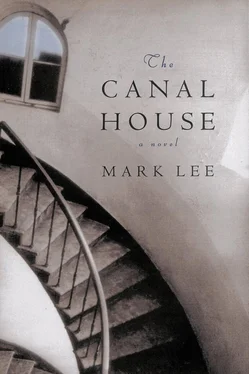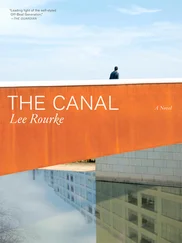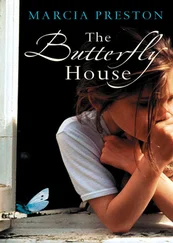“Richard won’t believe you. I’ve never argued passionately about anything.”
We stood together in the hallway. “You think you’re a cynical person, Nicky. Sometimes I feel the same way about myself.” Julia nodded to the Rivertons as they walked past us. “But we’re both amateurs in this crowd.”
I WAS RESTLESS that night and didn’t feel like going to sleep. The Irish antiques were so carefully arranged that I was tempted to push the furniture into sloppy clusters. I drank two large glasses of whiskey, then put the gum boots and the rest of my hunting kit back in the basket. I decided to go downstairs and give it back to one of the servants. Maybe I would find a lonely maid folding table napkins who wanted to talk.
At night, the hallways were like a real medieval castle: dark and empty with a draft of cold air coming from somewhere. Downstairs, I got lost twice before finding the hallway that led to the library. I decided to take another look at the Turner painting and headed toward a yellowish light that glowed through the glass panels.
I stopped and peered through the glass. Daniel and Julia were at the end of the room, sitting in front of a fire. Daniel was on a small couch, leaning forward with his hands clasped together. There was a direct sincerity, an openness in his manner, that reminded me of our conversations back in Italy. Julia sat on a straight-back chair about four feet away from the couch. She wore the dress from dinner with a black shawl draped around her shoulders.
I saw all this in a moment, a quick glance through a pane of glass. There were two sources of light, a reading lamp near the bookshelves and the fire itself. Although I couldn’t see the expressions on their faces, their bodies showed the unity of a single composition. If I had been in the room with a camera, I would have taken the photograph with the orange glow of the firelight slightly left of center. It looked as if Julia was pulling Daniel toward her.
I had always savored the intimate moments of strangers: a man embracing his wife at the Macedonian border, a young woman in Cape Town holding her lover’s hand. But I knew Daniel and Julia, and that made all the difference. Like a thief startled by a burst of light, I turned quickly and hurried away.
I left the bathroomlight on in my room, but the ghost came back with his creaks and sighs. Early in the morning I heard a sharp tapping sound, and I was half convinced that the dead Mr. Robinson was trying to send me a message. When I got out of bed, I realized that the tapping came from somewhere outside the house. Yanking open the curtain, I saw men pounding stakes into the grass. They were beginning to set up tents for the party.
I got dressed and went outside. The grass was still wet from last night’s storm, but there was a sharp breeze and the clouds were moving south. Out in the courtyard it looked like the circus had come to town. A gang of young Welshmen had already raised one large white tent and were working on a second. Canopies and portable walkways connected these two structures to a pair of smaller tents, one for the cooks and the other for a bumper-car ride.
Trucks squeezed through the main gate where a forklift unloaded storage containers. A trailer with toilets and dressing rooms had been set up near the house for a circus troupe—muscular men and women from eastern Europe. I could see some performers sitting on lawn chairs, smoking cigarettes and watching everyone else work. Butchers showed up with cases of meat. There were dance floor installers, liquor deliverymen, and electricians who connected every cord to a thick black power cable that snaked over the wall.
A young woman carrying a loose-leaf binder stood in the middle of the confusion. She was small and trim, with short blond hair, and looked like the kind of person who had done gymnastics as a child. Before I could say anything, she approached me and flipped through her binder.
“Are you one of the comedians?”
“No. I’m Nicky Bettencourt.”
She recognized my name and nodded. “Dreadfully sorry. I’m Vivian Hedges. I’ve hired two comedians and neither one of them is here.”
“Are they putting on a show?”
“Not exactly. They’re part of the computerized entertainment.”
The forklift whizzed past us carrying a portable stove and Miss Hedges hurried after it. I tagged along, peering over her shoulder, and discovered that the binder contained employee names, pager numbers, and a twelve-hour schedule, broken down into five-minute increments. Disasters didn’t frighten Miss Hedges. There was even a section marked CONTINGENCY PLANS.
Most men I know dream about movie stars or the airbrushed models in lingerie catalogs. My secret desire was to marry someone like Miss Hedges. There was something irresistible about her meticulous planning and her belief that there was a correct way to do everything. Under her influence, my own sloppy life would become organized.
I raised my camera and got shots of her dealing with a drunken Polish midget who was part of the circus troupe and a French chef who kept poking his finger at the gills of a sea bass. Miss Hedges spoke in a polite but firm voice and pointed to her binder as if it were a sacred text.
In the middle of all this confusion the two young comedians showed up in a mud-splattered sedan. They got out, looked around at the castle, and began to complain about their advance payment.
Miss Hedges smiled at me. “I’m sorry, Mr. Bettencourt. But I need to speak to them privately.”
“Sure.” I lowered my camera. “Maybe I’ll see you later on today.”
I returned to the morning room to get breakfast and found Julia drinking tea at the mahogany table. She was wearing a sweater and jeans. No jewelry. The clothes looked far more natural on her than the dresses she had worn at dinner. “Did you sleep well, Nicky?”
“All right. This is a creaky place.”
“It’s a ridiculous place. Imagine cutting down hundreds of trees and digging up tons of slate just because you liked Ivanhoe .”
I served myself some scrambled eggs, then dropped two slices of bread into the toaster. “If you have a free hour, maybe you could give me a tour.”
“Sorry, there’s no free time. I’ve already been given my schedule. I have to escort Connie and Jax to a beauty salon and then we’ll have lunch together. They’ll spend the whole day gossiping. First they’ll say, ‘She’s one of my best friends,’ then they’ll tell you something awful.”
“Make an excuse. Don’t go.”
“It’s important that they have a pleasant weekend. They’ve given political support to Hand-to-Hand. It’s maddening to think that being charming and buying the right kind of champagne has anything to do with feeding hungry people, but it’s all connected. You saw the refugees and the IDPs at Kosana. The food they were eating was purchased by this silly charity auction we had last summer. People paid a great deal of money to fly to Barbados in Richard’s corporate jet.”
The toast popped up and I returned to the side table. “I guess it’s necessary.”
“Of course. But sometimes your activities are so far removed from the result that it all gets rather convoluted. For example, I want to buy four portable power generators for Hand-to-Hand which means”—Julia finished her tea and stood up from the table—“I get my hair done in Cheltenham.”
AFTER BREAKFAST, I put on a jacket and went back outside. I walked around to the tennis court and found Digran sitting alone on a bench. The poet wore a new Burberry trench coat that was two sizes too large for him; his body seemed lost in the loops and the buckles.
“How are you, Mr. Petrosyan?”
Читать дальше












